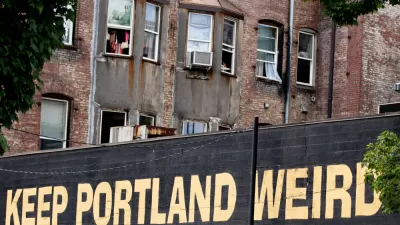Facing calls to invest in racial equity, companies like Netflix, Twitter, and others have recently pledged millions in new financing for affordable housing, small businesses, and other community development projects. Will they stick around?

Corporate America has traditionally been content to sit out of conversations about hot-button issues. But as the Movement for Black Lives gained steam in communities large and small last year in the wake of the murder of George Floyd, a Black Minneapolis man killed by the officer who was arresting him, many companies found it difficult to ignore the pressure from employees and the public to take a stand. For some companies, that took the shape of symbolism such as making Juneteenth a paid holiday for employees or, in the case of NASCAR, banning Confederate flags from events. Many other companies pledged millions of dollars in support of racial justice initiatives and investments in Black-owned businesses.
Given the deep racial inequalities in both rental housing and homeownership in the United States and housing’s link to the country’s racial wealth gap, it is of little surprise that the affordable housing and community development world has recently received substantial investment and philanthropy from big companies looking to support racial justice.
In December 2020, Netflix pledged a $25 million loan to community development intermediary Enterprise Community Partners’ new Equitable Path Forward initiative to fight racial inequities in housing. The initiative has also been seeded with a $5 million loan from Northern Trust financial services company and a $1 million loan from Siemens manufacturing company. Netflix also loaned $25 million to Project 10X, the racial equity initiative of LISC, the country’s other major community development intermediary. LISC also received $25 million each in loans from Square and Costco. LISC and Enterprise both operate community development financial institutions.
In November of last year, Twitter pledged to invest $100 million and give a $1 million grant to Opportunity Finance Network’s (OFN) Finance Justice Fund, which aims to direct $1 billion in CDFI funding to underserved communities. Starbucks also announced $100 million in investments in CDFIs. Last year, MacKenzie Scott donated $5.9 billion to nearly 500 nonprofits and charities, including 27 CDFIs in OFN’s member network, as part of her pledge to give away the majority of her tens of billions in Amazon wealth.
The new corporate interest in community development comes on the heels of big tech’s 2019 commitments to invest significant sums into affordable housing, including a $2.5 billion pledge from Apple, $1 billion pledges from Facebook and Google, and a $500 million pledge from Microsoft.
CDFIs are, understandably, thrilled with the hundreds of millions of dollars in investments coming their way that they can funnel to affordable housing developers, small businesses, and other community development projects. They say that because these corporations are not concerned with having their investments match up with specific assessment areas to fulfill their obligations under the Community Reinvestment Act (CRA)—as the large banks and financial institutions that have traditionally invested in affordable housing are—the new funding should stretch further and have a broader geographic reach. And though few people are criticizing corporations for making multimillion-dollar affordable housing and community development loans, some in the affordable housing world say there’s a lot more that companies could do with how they structure the loans, the size of the gifts they make, and where they direct their money to really move the needle on the housing crisis.
Putting Money to Work
Enterprise Community Loan Fund President Lori Chatman says the way the pandemic and racial justice protests have highlighted societal inequities have spurred companies to act. “It has brought us to a place where more folks who have the ability to have influence and make a change are opting to do so. . . . I want to seize the moment and show them all the benefits we can have for a bigger impact on society.”
The Equitable Path Forward initiative seeks to ...
FULL STORY: Finance and Chill? Big Tech Flirts with Community Development

Alabama: Trump Terminates Settlements for Black Communities Harmed By Raw Sewage
Trump deemed the landmark civil rights agreement “illegal DEI and environmental justice policy.”

Planetizen Federal Action Tracker
A weekly monitor of how Trump’s orders and actions are impacting planners and planning in America.

The 120 Year Old Tiny Home Villages That Sheltered San Francisco’s Earthquake Refugees
More than a century ago, San Francisco mobilized to house thousands of residents displaced by the 1906 earthquake. Could their strategy offer a model for the present?

In Both Crashes and Crime, Public Transportation is Far Safer than Driving
Contrary to popular assumptions, public transportation has far lower crash and crime rates than automobile travel. For safer communities, improve and encourage transit travel.

Report: Zoning Reforms Should Complement Nashville’s Ambitious Transit Plan
Without reform, restrictive zoning codes will limit the impact of the city’s planned transit expansion and could exclude some of the residents who depend on transit the most.

Judge Orders Release of Frozen IRA, IIJA Funding
The decision is a victory for environmental groups who charged that freezing funds for critical infrastructure and disaster response programs caused “real and irreparable harm” to communities.
Urban Design for Planners 1: Software Tools
This six-course series explores essential urban design concepts using open source software and equips planners with the tools they need to participate fully in the urban design process.
Planning for Universal Design
Learn the tools for implementing Universal Design in planning regulations.
Clanton & Associates, Inc.
Jessamine County Fiscal Court
Institute for Housing and Urban Development Studies (IHS)
City of Grandview
Harvard GSD Executive Education
Toledo-Lucas County Plan Commissions
Salt Lake City
NYU Wagner Graduate School of Public Service





























